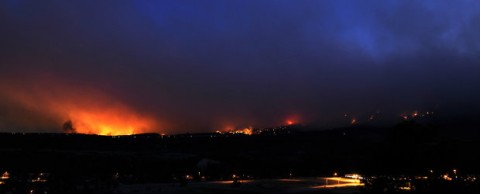Displacement and fear

Two Sundays ago, my congregation watched as pillars of smoke and flame spoiled the view of Pike’s Peak from our sanctuary windows. After that, our city—Colorado Springs—experienced mass evacuations that had people gathering a few possessions and heading into smoke-choked streets to hotels, shelters and other people’s homes.
In the chaotic days that followed, I sat down to prepare a sermon. I didn’t know where it would be delivered. Would we be in our own building or sharing space elsewhere? The uncertainty didn’t sit well (does it ever?). But as hospitality, prayer and concern poured into our parish from many others, I understood more deeply that the church is not a place—it is us.
The assigned readings for that week spoke to the uncertainty and fear of being displaced. The passage from the Wisdom of Solomon told me that regardless of how the fires rage, our presence together on the Sunday following our evacuation is proof that “the dominion of Hades is not on earth.” In Lamentations, we hear the source of hope in the midst of loss: “The steadfast love of the LORD never ceases, his mercies never come to an end."
As we watched the fire crest the hills bordering the northwest side of the city, our hope seemed to be at the point of death. When Jairus’s daughter was dying, Jesus told him, “Do not fear, only believe.” This is what was required of us as smoke loomed and flames roared. On that awful Tuesday afternoon—when thousands of people fled their neighborhoods and joined the choke of traffic headed east, as fire literally spilled down the hills into their neighborhoods—I believe Jesus spoke these words to us.
I kept thinking about the famous quote from Franklin Delano Roosevelt, “The only thing we have to fear is fear itself.” He said this in 1933, in the darkest days of the Great Depression. It was a time of tremendous dislocation. For millions of Americans, prosperity had morphed into poverty over the course of just a couple years. Banks failed, savings disappeared and jobs were impossible to come by. Land that had once been verdant and productive became a dusty wasteland.
Against this backdrop, FDR insisted that there was nothing to be afraid of except fear. But he wasn’t skirting the truth or pretending things weren’t so bad—in fact, the line came in the context of an appeal for what he called “the whole truth” spoken “frankly and boldly.” FDR was saying that in the face of disaster, hope and faith in something greater can and must prevail.
For Christians, this something greater is embodied in one another. Our community has suffered great economic loss, and we have gone through a terrible time of uncertainty and worry. The rebuilding will be long and difficult, but I believe it will help us to know, more than ever, who we are. We are the people of God, created in God’s own image, and for that reason we love and care for one another.
The Wisdom of Solomon tells us that righteousness is immortal. Fires will rage, houses will be destroyed and people will even perish, yet “God created us for incorruption, and made us in the image of his own eternity.” We are created in the image of a God who always makes room for us when the houses of our creation fail us. There is nothing to fear.




